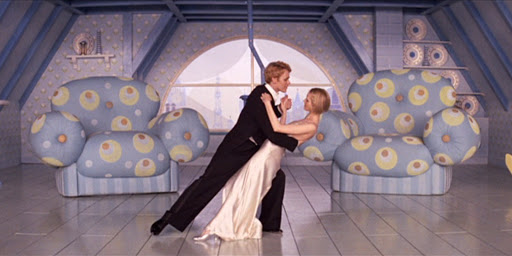The Boy Friend, a musical directed by Ken Russell (a director you wouldn’t associated with typical musicals—or typical movies of any kind, really) attempts to juggle several different levels of plots, not always very successfully. However, rather than trying to reconcile the disparate sections of the movie in your mind, you might just want to concentrate upon the musical numbers and the strong performances by a couple of stars early in their careers. In the 1920s, a theatrical company is mounting a production of a musical entitled The Boy Friend. The female star of the musical is injured, and Polly, the assistant stage manager (played by Twiggy with a real sense of wide-eyed gameness), has to take over the role. A famous film producer is in the audience and will be observing the show, so there is pressure to do a good job. Unfortunately, the play is a disastrous production. Everyone really wants to impress the Hollywood producer, but the show itself doesn’t really help them to get the kind of attention they desire. On another level, there’s the stage musical itself, which plays out in sequence throughout the film’s frame story. Sometimes the onstage musical and the backstage events seem to blend smoothly, such as Polly’s crush on the leading man, Tony (the quite beautiful Christopher Gable), that mirrors her character’s crush on the character that Tony is playing. And, strangely, interspersed throughout the film is a series of fantasy sequences, including one that takes place on top of a record and another that involves elves. It’s tough not to like Busby Berkeley homages in musical films even though they can be very strange homages at times, to say the least, in The Boy Friend. Still, a couple of the performers demonstrate why they would have long careers. In her first major film, Twiggy has a true star turn as Polly. She turns out to be a pretty good dancer, and her ability to portray Polly’s conflicted emotions easily make her the heart of the film’s narrative. Tommy Tune, appearing in only his second feature film, demonstrates why he was/is one of the greatest tap dancers in the history of film (and theater). Tune doesn’t get a lot of screen time here compared to the leads, but what he does get are showcases for his talents. The remarkable Glenda Jackson shows up about an hour into the film to make a brief appearance, and the screen practically crackles with her presence. Overall, the film is a bit of a mess, and it might have been more effective had it followed the original play’s more old-fashioned structure.
Oscar
Nomination:
Best Scoring Adaptation and Original Song Score

No comments:
Post a Comment